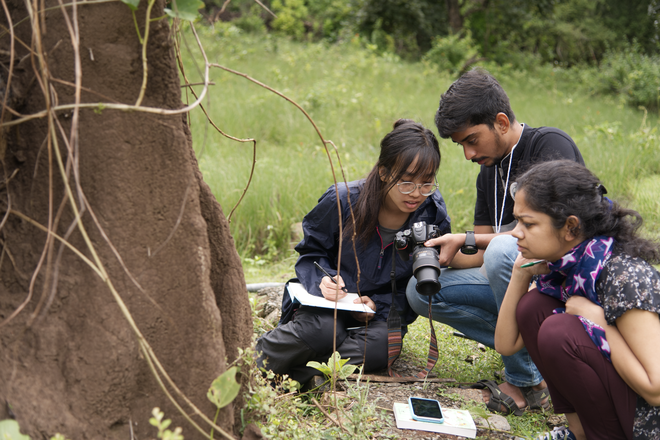Every week on Saturday, Mihir Pathak visits a Government school in Pipariya, a town in Madhya Pradesh’s Hoshangabad district. He introduces children there to lessons on the environment. “These are children from villages near the Satpura tiger reserve,” points out the 27-year-old. “Literacy level is low in the region and I use environment education as a tool to teach children to read and write, as well as help them think scientifically.” Mihir is among the 20 Earth Educators who won a fellowship constituted by the non-profit Youth Conservation Action Network (YouCAN).
The fellowship, that was initiated with a grant from the National Geographic Society, aims to equip volunteers for the environment with tools to facilitate activity-based lessons on Nature and conservation. “We wanted to create a generation of young earth educators who work with children in an exciting way,” says K Ramnath Chandrasekhar, who co-founded YouCAN along with his partner Rachita Sinha. The 32-year-old is a trained wildlife filmmaker, photographer and conservation educator himself, and lives in Coonoor.

Through interviews and video interactions, the YouCAN team selected 20 people from 12 States such as Tamil Nadu, Madhya Pradesh, Himachal Pradesh, Karnataka, and Jammu and Kashmir. Among them are full-time teachers, environmental volunteers, Nature enthusiasts, and researchers. Mihir, for instance, works with the Eklavya Foundation, an NGO working in education.
With tools that he gained through the fellowship, he teaches his students concepts like low-waste living, Nature journalling and bird watching, that he connects with school curricula. “The sessions will facilitate leadership qualities and problem-solving skills, and will help children grow,” he points out, adding, “Often, we tend to romanticise the lives of rural children saying that they live in tune with Nature. It is true, they are aware of the names of birds and trees of their region. But I want to help them think beyond that tree. What are the aspects that threaten the tree, for instance.”
This is what Ramnath and Rachita envision for their Earth Educators: that he/she will connect localised Natural history with the bigger picture. All of them attended a seven-day in-residence programme at Masinagudi in the Nilgiris in June this year, during which they were trained by experts in the field such as wildlife filmmaker Shekar Dattatri, and naturalists Yuvan Aves, Faiza Mookerjee and Surya Ramachandran, among others.
“We will support them through the 11-month fellowship with a nominal monthly allowance, educational resources, monthly workshops, and everyday interactions. At the end of the fellowship, they will participate in the Educators Festival towards the end of April 2023,” explains Ramnath.
The fellowship is designed such that Earth Educators are inspired to start their own passion projects specific to the communities they work in. Puducherry-based Anuviya Anbuselvam, who is now working as an environmental education coordinator at Pichandikulam Forest in Auroville, hopes to create a tailor-made project for children in Thoothukudi. Right now, though, she is helping with the back-end work of outreach programmes for Government and Corporation school students in Classes VI, VII, and VIII at Marakkanam, Puducherry and Chennai. Her goal, she says, is to “make children look around them. This forms the foundation of a good environment educator”.
Earth Educators, all of them aged between 20 and 35, teach children from various backgrounds. “There are children going to private IGCSE schools as well as those who study at a school near a landfill,” says Ramnath.
The team is reaching out to more people. Their ultimate aim, according to Ramnath, is to “bring policy-level change in environmental awareness and training in India”.







